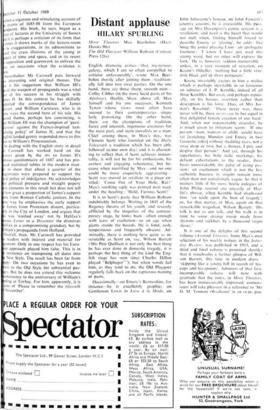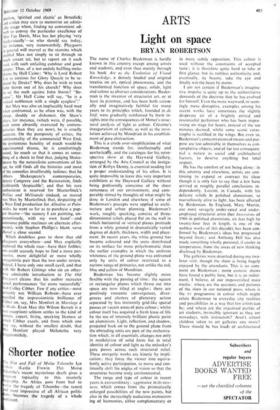Distant applause
HILARY SPURLING
More Theatres Max Beerbohm (Hart- Davies 90s) The Old Playgoer William Robson (Centaur Press 126s) English dramatic critics—'that mysterious galaxy, which I am so often compelled to criticise unfavourably', wrote Max Beer- bohm shortly after joining them—tradition- ally fall into two rival parties. On the one hand, there are those sharp, smooth men— Colley Cibber (in the more lucid parts of his Apology), Hazlitt, Shaw above all, Max himself and his one successor, Kenneth Tynan—whose views must often have seemed to their contemporaries singu- larly provoking. On the other hand, there are the champions of tradition, fierce and uncouth, ingenuous creatures for the most part, and stern moralists to a man. Chief among these, in Max's day, was Clement Scott who founded on the Daily Telegraph a tradition which has been ably followed tizt*tir own day; and it is chasten- ing to reflect that, if Scott achieves immor- tality, it will not be for his enthusiasm, his earnest arid engaging vehemence, but be- cause when mortified by Max—and no one could be more exquisitely aggravating- - Scott was moved to retaliate in a piece en- titled: 'Come Out of Your Hole, Rat!' Max's soothing reply was printed next week under the heading: 'Hold, Furious Scott!'
It is to Scott's party that William Robson indubitably belongs. Writing in 1845 of the Regency theatre of his youth, and severely afflicted by the iniquities of the contem- porary stage, he looks back—often enough with tears of exultation—to an age when giants strode the boards. He is fond, rash, tempestuous and frequently obscure. Ad- mittedly, there is nothing here quite as in- scrutable as Scott on, say, Wilson Barrett ('His Pete Quilliam is not only the best thing he has ever done in domestic tragedy, it is perhaps the best thing of the kind the Eng- lish stage has seen since Charles Dillon played "Belphegor" '); but when words fail him, as they tend to do, the Old Playgoer regularly falls back on the rapturous naming of parts.
Occasionally—on Emery's Barnardine, for instance—he is excellently graphic; on Gentleman Lewis in Love a In Mode, on
John Johnstone's brogue, on John Faweett's country cousins, he is irresistible. His pass- age on Mrs Davenport's comic scream is a revelation: and hard is the heart that would not melt when, finding himself forced to describe Emery as 'Oaring', he adds—like Snug the joiner pla■ ing Lion—an apologetic footnote: 'I know I have just used this strong word, but no other will express the look.' He is, however, seldom memorable - unless, in a rare moment of vexation, on Keane's Othello: 'nothing but a little vixe- nish black girl in short petticoats.'
Keane invariably excites in him a malice which is perhaps inevitable in so ferocious an admirer of J. P. Kemble, indeed of all three Kembles. But even, and perhaps especi- ally, on his heroes, assertion rather than description is his forte. Thus, of Mrs Jor- dan's Rosalind : 'There never was, there never will be, there never can be her equal in that delightful female creation of our bard.' And, when not impenetrably oracular, he is much given to indignant scorn: 'If one peison—man, woman or child--could have sat [watching Munden and Emery in two favourite roles] without shedding tears, not a stray drop or two, but a shower, 1 pity and despise that person !' And yet, through his superlatives, his bold italic markings, his defiant exhortations to the reader, there beats unmistakably the pulse of rising pas- sion: an excitement which is not the less authentic because its origins remain more often than not tantalisingly vague. So that it matters little if his more hectic eulogies of John Philip remind one uneasily of Haz- ha's phrase, whet?. Kemble had displeased him—'an icicle upon the bust of tragedy': or, for that matter, of Max, again on that remarkable tragedian, Wilson Barrett: 'His talk is not as our talk, and his walk is in time to some strange music made from shawms and sackbuts by a thousand virgin slaves.'
It is one of the delights of this second volume (Around Theatres, from Max's own selection of his weekly notices in the Satur- day Review, was published in 1953, and a third and final volume is promised shortly) that it vouchsafes a further glimpse of Wil- son Barrett, this time in modern dress- - 'skipping like a young hill in search of tea- cups and tea-spoons'. Admirers of that first. incomparable volume will note with gratitude that the index, in More Theatres, has been immeasurably improved; connois- seurs will take pleasure in a reference to 'Mr H. M. Tennent (Wadham)' in an OUDS pro- duction, 'spirited and elastic' as Benedick; arid critics may care to memorise an admir- able usage when, finding no convenient ad- verb to convey the particular excellence of Nliss Fay Davis, Max has her playing 'very faydavisically'—as who should say today, for instance, very ireneworthily. Playgoers in general will marvel at the stamina which enabled Max not simply to sit through so much arrant tat, but to report on it each ■■tek with such unfailing candour and good temper. Thus, of a not unduly baffling melo- drama by Hall Caine: 'Why is Lord Robert Lre so anxious for Glory Quayle to be se- duced by Drake? Why does he wish to turn John Storm out of his church? Why does he set the mob against John Storm? "Be- cause", Mr Hall Caine will say, "he is a wicked nobleman with a single eyeglass".'
But Max was also an implacably hard man when confronted, as he often was, with the cheap, shoddy or dishonest. On Shaw's plays, for instance, (which were, if possible, even more absurdly overrated by contem- poraries than they are now), he is cruelly accurate. On the pomposity of critics, the sentimentality of the commercial West End, the portentous banality of much would-be experimental drama, he is comfortingly sound. So much so that it comes as some-
ing of a shock to find that, judging Shake- speare by the naturalistic conventions of his age, he still finds all the histories and most of the comedies insufferably tedious; that he abhors Shakespeare's contemporaries, etests Congreve and the Restoration, finds
oldsmith `despicable'; and that his rare enthusiasm is reserved for Maeterlinck's Pellet's and Milisande (indeed, so moved
as Max by Maeterlinck that, despairing of
• West End production for Alladine et Palo- lides, he went so far as to purchase a pup- • et theatre—`the scenery I am painting, un- retentiously, With my own hand'—and nnounce public matinees on alternate after- oons), with Stephen Phillips's blank verse erod a close second.
Which doubtless goes to show that old laygoers everywhere—and Max explicitly eplored the whole race—have their foibles; ne could scarcely hope to find a more per- uasive, more delightful or more wholly ntagonistic pair than the two under review. deed, I have only one small cavil, and that 'th Mr Robert Gittings who (in an other- Ise admirable introduction to The Old aygoer) claims that his author recreates ctual performances 'far more successfully' an Colley Cibber. Few if any critics—most ertatnly not William Robson—have ever qualled the impressionistic brilliance of bber on, say, Mrs Monfort in Marriage a a Mode. Even Max (his Wilson Barrett is a are exception) seldom settles to the kind of 'flute, expert, living, speaking likeness at hich Cibber excels, and from which one ay say, without the smallest doubt, that rs Monfort played Melanctha very aggiesmithily.











































 Previous page
Previous page